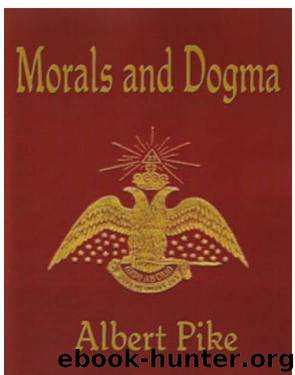Morals and Dogma by Pike Albert

Author:Pike, Albert [Pike, Albert]
Language: eng
Format: epub
Publisher: Global Grey
Published: 2016-04-05T23:00:00+00:00
XXV.Knight Of The Brazen Serpent
THIS Degree is both philosophical and moral. While it teaches the necessity of reformation as well as repentance, as a means of obtaining mercy and forgiveness, it is also devoted to an explanation of the symbols of Masonry; and especially to those which are connected with that ancient and universal legend, of which that of Khir-Om Abi is but a variation; that legend which, representing a murder or a death, and a restoration to life, by a drama in which figure Osiris, Isis and Horus, Atys and Cybele, Adonis and Venus, the Cabiri, Dionusos, and many another representative of the active and passive Powers of Nature, taught the Initiates in the Mysteries that the rule of Evil and Darkness is but temporary, and that that of Light and Good will be eternal.
Maimonides says: "In the days of Enos, the son of Seth, men fell into grievous errors, and even Enos himself partook of their infatuation. Their language was, that since God has placed on high the heavenly bodies, and used them as His ministers, it was evidently His will that they should receive from man the same veneration as the servants of a great prince justly claim from the subject multitude. Impressed with this notion, they began to build temples to the Stars, to sacrifice to them, and to worship them, in the vain expectation that they should thus please the Creator of all things. At first, indeed, they did not suppose the Stars to be the only Deities, but adored in conjunction with them the Lord God Omnipotent. In process of time, however, that great and venerable Name was totally forgotten, and the whole human race retained no other religion than the idolatrous worship of the Host of Heaven."
The first learning in the world consisted chiefly in symbols. The wisdom of the Chaldæans, Phœnicians, Egyptians, Jews; of Zoroaster, Sanchoniathon, Pherecydes, Syrus, Pythagoras, Socrates, Plato, of all the ancients, that is come to our hand, is symbolic. It was the mode, says Serranus on Plato's Symposium, of the Ancient Philosophers, to represent truth by certain symbols and hidden images.
"All that can be said concerning the Gods," says Strabo, "must be by the exposition of old opinions and fables; it being the custom of the ancients to wrap up in enigma and allegory their thoughts and discourses concerning Nature; which are therefore not easily explained."
As you learned in the 24th Degree, my Brother, the ancient Philosophers regarded the soul of man as having had its origin in Heaven. That was, Macrobius says, a settled opinion among them all; and they held it to be the only true wisdom, for the soul, while united with the body, to look ever toward its source, and strive to return to the place whence it came. Among the fixed stars it dwelt, until, seduced by the desire of animating a body, it descended to be imprisoned in matter. Thenceforward it has no other resource than recollection, and is ever attracted toward its birth-place and home.
Download
This site does not store any files on its server. We only index and link to content provided by other sites. Please contact the content providers to delete copyright contents if any and email us, we'll remove relevant links or contents immediately.
The Four Agreements by Don Miguel Ruiz(6765)
Breaking Free by Rachel Jeffs(4217)
The Hatha Yoga Pradipika (Translated) by Svatmarama(3341)
120 Days of Sodom by Marquis de Sade(3273)
Member of the Family by Dianne Lake(2352)
The Tao of Physics by Fritjof Capra(2276)
The Psychedelic Gospels: The Secret History of Hallucinogens in Christianity by Jerry B. Brown(2157)
The Road to Jonestown by Jeff Guinn(2066)
Going Clear: Scientology, Hollywood, and the Prison of Belief by Lawrence Wright(1985)
Going Clear by Lawrence Wright(1967)
Uriel's Machine by Christopher Knight(1899)
The Grand Grimoire: The Red Dragon by Author Unknown(1812)
The Gnostic Gospel of St. Thomas by Tau Malachi(1798)
Key to the Sacred Pattern: The Untold Story of Rennes-le-Chateau by Henry Lincoln(1634)
Animal Speak by Ted Andrews(1624)
The Malloreon: Book 02 - King of the Murgos by David Eddings(1594)
Waco by David Thibodeau & Leon Whiteson & Aviva Layton(1559)
The New World Order Book by Nick Redfern(1550)
The Secret History of Freemasonry by Paul Naudon(1502)
